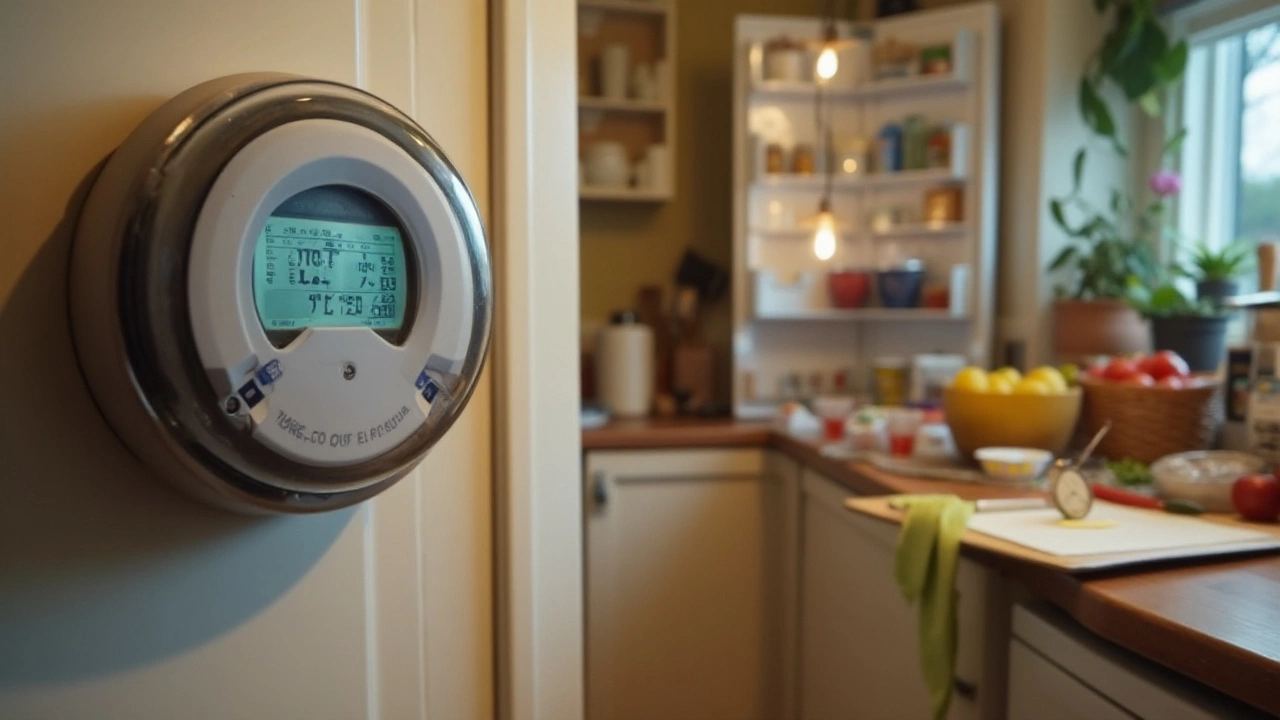Refrigerators are a staple in every home, diligently working behind the scenes to keep our food fresh and safe. But like any other appliance, fridges too have their breaking points. One of the key components that often faces wear and tear over time is the compressor. Knowing the signs of a failing compressor can save you not only from a malfunctioning fridge but from the frustration of dealing with spoiled groceries.
From bizarre noises to unexplained temperature shifts, there are a few telltale signs that your fridge might be trying to tell you that it's time for a check-up. Add to that the stress of a steadily climbing energy bill, and you've got real cause for concern. Recognizing these clues early on can lead to a timely fix or replacement, ensuring your refrigerator runs smoothly for years to come.
- Recognizing Unusual Noises
- Temperature Fluctuations Inside the Fridge
- Rising Energy Bills
- Repair or Replace: Making the Decision
Recognizing Unusual Noises
Your refrigerator lives quietly in the corner of your kitchen, dutifully working without much fanfare. Yet, when it starts speaking up with strange noises, it’s time to pay attention. One of the earliest signs that your fridge might be headed for trouble is a sudden clamor coming from the back. These noises can range from a persistent hum to a more alarming clunk or grind. If you notice your appliance making a cacophony like an old chest of treasures, it might be a signal of a failing compressor. The compressor is the heart of your refrigeration unit, and when it begins to falter, it often protests with sounds that are hard to ignore.
There’s a variety of reasons why your trusty cooler might be drumming up a storm. Over time, the internal components of your fridge, such as fans and motors, can wear down. When this happens, those parts, especially the compressor, might produce a loud racket as they struggle to function. It's essential to discern between the regular hum of a **refrigerator** and the ominous churning of a problematic compressor. A quiet hum is typical, indicating your fridge is operating just as it should. However, if the sound is more akin to a rattling fan, it could mean the compressor is straining and parts are clanking against each other.
Distinguishing these noises requires a keen ear and a bit of detective work. Listen closely to the sound patterns, volume, and frequency. Is the noise constant or does it come and go? Persistent noises might point towards worn compressor bearings or a loose motor mount. Every sound is like a clue to what's happening behind those stainless-steel doors. Apart from noise, vibration is another red flag. A properly functioning fridge should stand steady, without excessive shaking. If you feel unexpected quivers each time it kicks on, your compressor might be battling against its last days.
Harriet Felder, a seasoned appliance repair specialist, once said, "A refrigerator that's screaming is not a happy refrigerator. Paying attention to those cries can save you a world of hassle and a freezer full of melted ice cream."
If you're tempted to ignore these audible cues, consider the potential consequences. A dodgy compressor not only leads to less effective cooling but could hike up your electricity bills as it works overtime to maintain temperature levels. When neglected, it may cause further damage, transforming minor repairs into a major overhaul. Thus, being attuned to your fridge's early warnings might just be the hero you need to save both your appliance and your groceries from an untimely demise.

Temperature Fluctuations Inside the Fridge
One of the most telling signs that your refrigerator's compressor might be in trouble is when you notice unusual temperature fluctuations inside the fridge. This seemingly invisible shift in climate can lead to food spoilage or a sudden, dramatic drop in the freshness of your groceries. Generally, a fridge should maintain a steady temperature of around 37 to 40 degrees Fahrenheit. If you find that your milk is consistently turning into a slushy mess or your leafy greens are wilting prematurely, it might be time to investigate the heart of the issue. What many don’t know is that the compressor is the lifeline of your refrigerator, working tirelessly to keep your food safe by regulating the internal environment.
In addition, these temperature changes could also spell trouble for frozen foods. Unexpected thawing may lead to costly waste and potential health risks. When the compressor is not functioning properly, it cannot preserve the stable coolness required to keep food from crossing into the danger zone. This is where bacteria can grow rapidly, making it essential to address this problem timely and effectively.
"The compressor acts much like the human heart," explains HVAC expert Julia Thorne from a recent interview, "It pumps the refrigerant, maintaining a critical flow. When this system falters, you start seeing inconsistent performance, a clear red flag for any refrigerator owner."
Another sign that these fluctuations might be due to a compressor issue is an increase in noise. A constant hum or suddenly noisy operation could indicate that the compressor is overworking to keep up the cool, but failing to do so efficiently. It's comparable to the compressor pulling an all-nighter without any results to show in the morning. As the appliance struggles, you’re left dealing with awkwardly soft ice cream and improperly chilled drinks.
If fluctuating temperatures become a regular annoyance, it may very well be time to weigh your options. Sometimes, fixing a particularly erratic compressor isn't cost-effective, and a replacement might be the prudent course of action. Before making any decisions, though, consulting with a qualified technician is usually wise. They can offer insights on the longevity of your current appliance and provide guidance on whether repair or replacement is the best investment.

Rising Energy Bills
It's a quiet morning, and as you sip your coffee, you glance at the utility bill you've just opened. Your eyes widen as you notice an unexpectedly high figure glaring back at you. Could your refrigerator be the culprit behind this unwelcome surprise? A malfunctioning fridge compressor might just be sneakily increasing your energy consumption. The compressor is the hardworking heart of your refrigerator, responsible for circulating refrigerant and maintaining optimal temperatures. When it struggles to do so, your appliance starts to consume more power than necessary, leading to higher energy bills.
Imagine the compressor as a marathon runner who is persistently running out of breath yet trying to keep up with the pace. If it has to work harder to achieve the same cooling effect, it becomes less efficient, causing your energy bills to skyrocket. Energy usage that seems inconsistent with your typical patterns should signal you to delve deeper into potential refrigerator issues. In many cases, unusual energy consumption often points towards failing components, especially a compressor struggling due to wear and tear or damage.
Spotting the Warning Signs
Start by monitoring your refrigerator's cycling patterns. A normally functioning fridge compressor turns on and off to maintain interior temperature, which should only happen a few times per hour. However, if you notice it running almost continuously, it's likely consuming more energy trying to compensate for its inefficiencies. This is often accompanied by another tell – a faint, constant buzzing sound—the sound of the compressor desperately trying to keep up and doing so at the expense of your energy consumption.
Weighing the Options
Once you've identified that the compressor might be at fault, it's important to weigh your options. While some may opt for a quick compressor repair, others might see this as a sign that it's time for an appliance upgrade. Repairs can temporarily solve energy wastage, but older models might merely limp along, worsening over time. A new, energy-efficient refrigerator could prove to be a savvy investment, ultimately saving you money on those monthly bills.
"On average, refrigerators account for about 13% of a household's total energy consumption," notes the U.S. Department of Energy. "A malfunctioning refrigerator can increase this, making it wise to periodically evaluate its performance."
Choose Wisely
Before making a decision, it can be worthwhile to consult with an appliance repair professional. They can often provide you with a cost-benefit analysis, weighing repair against replacement costs. Remember, a high utility bill not only affects your wallet but also hints at broader efficiency issues in your home. Spotting such issues early can make all the difference. Whether it means fixing a faulty component or investing in a new model, addressing a failing refrigerator compressor will lead to peace of mind and more predictable monthly expenses.

Repair or Replace: Making the Decision
When it comes to making decisions about major home appliances like your refrigerator, determining whether to repair or replace can often feel daunting. But remember, the choice isn’t always black and white. The age of your appliance, costs involved, and the nature of the problem all weigh heavily on this decision. Generally, if your refrigerator is within ten years old, repairs might still make sense. However, if you're looking at a fridge that's over a decade old, a replacement could be more cost-effective in the long run, especially with advancements in energy-saving technology.
One practical approach is the 50% rule: if the cost of repair approaches or exceeds half the value of buying a new appliance, replacing it might be a smarter move. Comprehensive inspections by a trained technician can provide a clear picture of the extent of damage. Sometimes, what looks like compressor failure could be a minor electrical glitch or a faulty relay start switch. Replacing such parts could breathe new life into your fridge and save you hundreds of dollars.
According to the Consumer Reports, "Replacing appliances with energy-efficient models can cut utility bills by up to 30%." Investing in a new fridge not only brings the advantage of reduced utility bills but often comes with modern features that enhance functionality and convenience.
An important aspect to consider is the environmental impact. Disposing of an old appliance adds to e-waste, so sometimes repairs can be a more environmentally friendly option. However, if your current fridge is inefficient and guzzling electricity, newer models with Energy Star certification often consume significantly less energy. This not only makes them eco-friendly but also friendlier to your wallet in terms of energy bills.
Understanding warranties is key in this decision-making process. Checking if parts like the compressor are under warranty can tilt the decision in favor of repairs, potentially reducing or eliminating costs. Many manufacturers provide extended warranty options at the time of sale that cover major components for several years.
Finally, the emotional aspect, though less tangible, is just as important. The time you've spent with an appliance, the reliability it's offered, and the memories attached to it might influence your choice. Whether you lean towards maintaining the old faithful fridge or settling for the sleek modern alternative, ensure your decision aligns not just with practicality but with personal peace of mind.

I am an expert in the services industry with a focus on appliance repair. My passion lies in understanding how things work and educating others in simple, engaging ways. This enthusiasm fuels my writing, where I delve into topics around appliance maintenance and troubleshooting. I aim to make these subjects clear and accessible to all readers.